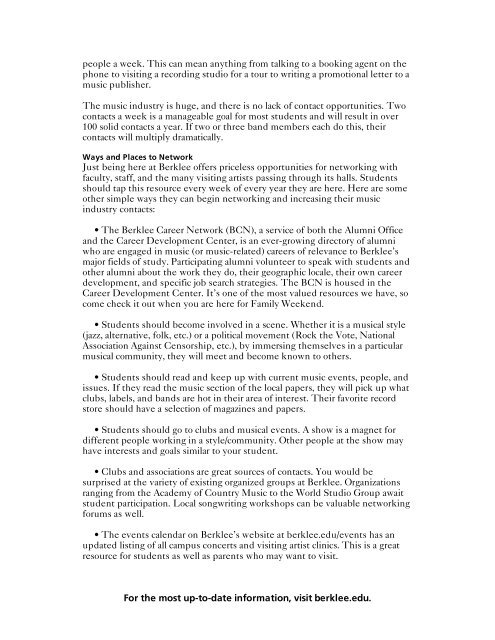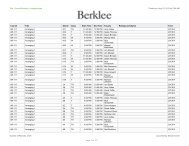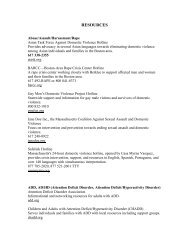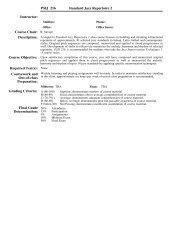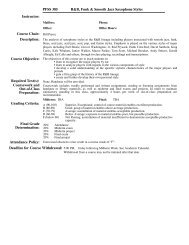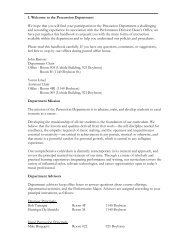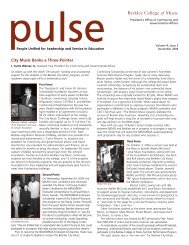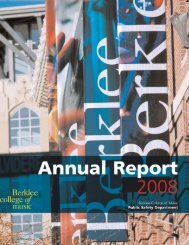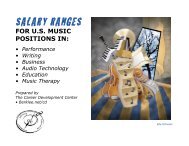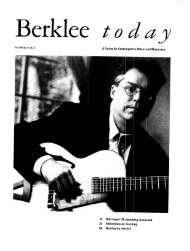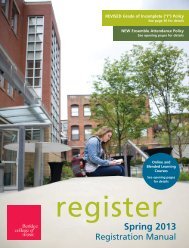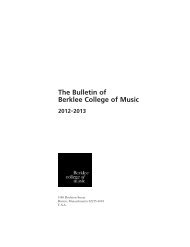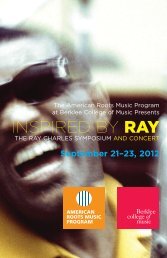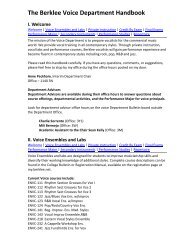Parent Handbook 2010–2011 - Berklee College of Music
Parent Handbook 2010–2011 - Berklee College of Music
Parent Handbook 2010–2011 - Berklee College of Music
Create successful ePaper yourself
Turn your PDF publications into a flip-book with our unique Google optimized e-Paper software.
people a week. This can mean anything from talking to a booking agent on the<br />
phone to visiting a recording studio for a tour to writing a promotional letter to a<br />
music publisher.<br />
The music industry is huge, and there is no lack <strong>of</strong> contact opportunities. Two<br />
contacts a week is a manageable goal for most students and will result in over<br />
100 solid contacts a year. If two or three band members each do this, their<br />
contacts will multiply dramatically.<br />
Ways and Places to Network<br />
Just being here at <strong>Berklee</strong> <strong>of</strong>fers priceless opportunities for networking with<br />
faculty, staff, and the many visiting artists passing through its halls. Students<br />
should tap this resource every week <strong>of</strong> every year they are here. Here are some<br />
other simple ways they can begin networking and increasing their music<br />
industry contacts:<br />
• The <strong>Berklee</strong> Career Network (BCN), a service <strong>of</strong> both the Alumni Office<br />
and the Career Development Center, is an ever-growing directory <strong>of</strong> alumni<br />
who are engaged in music (or music-related) careers <strong>of</strong> relevance to <strong>Berklee</strong>’s<br />
major fields <strong>of</strong> study. Participating alumni volunteer to speak with students and<br />
other alumni about the work they do, their geographic locale, their own career<br />
development, and specific job search strategies. The BCN is housed in the<br />
Career Development Center. It’s one <strong>of</strong> the most valued resources we have, so<br />
come check it out when you are here for Family Weekend.<br />
• Students should become involved in a scene. Whether it is a musical style<br />
(jazz, alternative, folk, etc.) or a political movement (Rock the Vote, National<br />
Association Against Censorship, etc.), by immersing themselves in a particular<br />
musical community, they will meet and become known to others.<br />
• Students should read and keep up with current music events, people, and<br />
issues. If they read the music section <strong>of</strong> the local papers, they will pick up what<br />
clubs, labels, and bands are hot in their area <strong>of</strong> interest. Their favorite record<br />
store should have a selection <strong>of</strong> magazines and papers.<br />
• Students should go to clubs and musical events. A show is a magnet for<br />
different people working in a style/community. Other people at the show may<br />
have interests and goals similar to your student.<br />
• Clubs and associations are great sources <strong>of</strong> contacts. You would be<br />
surprised at the variety <strong>of</strong> existing organized groups at <strong>Berklee</strong>. Organizations<br />
ranging from the Academy <strong>of</strong> Country <strong>Music</strong> to the World Studio Group await<br />
student participation. Local songwriting workshops can be valuable networking<br />
forums as well.<br />
• The events calendar on <strong>Berklee</strong>’s website at berklee.edu/events has an<br />
updated listing <strong>of</strong> all campus concerts and visiting artist clinics. This is a great<br />
resource for students as well as parents who may want to visit.<br />
For the most up-to-date information, visit berklee.edu.


